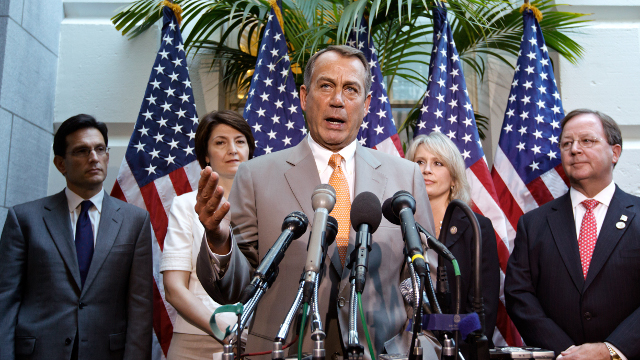
House Speaker John Boehner of Ohio, center, joined by other House GOP leaders, gestures during a news conference on Capitol Hill in Washington, Wednesday, June 27, 2012. (AP Photo/J. Scott Applewhite)
In January of 2001, a blue-ribbon Senate committee headed by Sens. Gary Hart (D-CO) and Warren Rudman (R-NH) released a report that would become famous for its prescient warning that “the persistence of international terrorism will end the relative invulnerability of the US homeland to catastrophic attack.”
But what most people don’t remember is that the Hart-Rudman report also cautioned that “the United States finds itself on the brink of an unprecedented crisis of competence in government” that made such an attack more likely to succeed. Blaming a variety of factors for a “decay” in “the human resources of government,” the committee concluded that Americans’ “declining orientation toward government service” is “deeply troubling.”
In the new issue of The Washington Monthly, Paul Glastris and Haley Sweetland Edwards look at how Republicans have deepened that crisis by gutting congressional staff — the faceless research, oversight and policymaking apparatus that makes the government function. Conservatives, they write, have engineered a “debilitating brain drain” that has “been under way in Congress for the past 25 years.”
Glastris and Sweetland Edwards write:
In 1995, after winning a majority in the House for the first time in forty years, one of the first things the new Republican House leadership did was gut Congress’s workforce. They cut the “professional staff” (the lawyers, economists, and investigators who work for committees rather than individual members) by a third. They reduced the “legislative support staff” (the auditors, analysts, and subject-matter experts at the Government Accountability Office [GAO], the Congressional Research Service [CRS], and so on) by a third, too, and killed off the Office of Technology Assessment (OTA) entirely….
Today, the GAO and the CRS, which serve both House and Senate, are each operating at about 80 percent of their 1979 capacity. While Senate committee staffs have rebounded somewhat under Democratic control, every single House standing committee had fewer staffers in 2009 than in 1994. Since 2011, with a Tea Party-radicalized GOP back in control of the House, Congress has cut its budget by a whopping 20 percent, a far higher ratio than any other federal agency, leading, predictably, to staff layoffs, hiring and salary freezes, and drooping morale.
Why would conservative lawmakers decimate the staff and organizational capacity of an institution they themselves control? Part of it is political optics: What better way to show the conservative voters back home that you’re serious about shrinking government than by cutting your own staff? But a bigger reason is strategic. The Gingrich Revolutionaries of 1995 and the Tea Partiers of 2011 share the same basic dream: to defund and dismantle the vast complex of agencies and programs that have been created by bipartisan majorities since the New Deal. The people in Congress who knew those agencies and programs best and were most invested in making them work—the professional staffers, the CRS analysts, the veteran committee chairs—were not going to consent to seeing them swept away. So they had to be swept away.
[…]
At the same time, as political scientist Lee Drutman of the Sunlight Foundation has noted, both the government and the issues it has to deal with have grown more complex. There are more contractors to manage, more stakeholders to liaison with, more technologies to adapt to, more industry-funded research studies to take account of. That, in turn, has made the jobs of congressional staffers, of keeping an eye on government and sorting through the ever-growing amount of information coming at them from lobbyists and constituents, far more difficult, even as their numbers have not remotely kept pace with the growth of government and K Street. In 2010, the House spent $1.37 billion and employed between 7,000 and 8,000 staffers. That same year, corporations and special interests spent twice as much—$2.6 billion—on lobbying (which excludes billions spent on other forms of influence) and employed 12,000 federally registered lobbyists, according to Sunlight Foundation.
Instead of helping to shrink the government, the gutting of congressional expertise and institutional capacity—what New America Foundation scholar and former congressional staffer Lorelei Kelly refers to as a “self-lobotomy”—has had two other effects, both of which have advanced conservative power, if not necessarily conservative ideals.
The first effect is an outsourcing of policy development. Much of the research, number crunching, and legislative wordsmithing that used to be done by Capitol Hill staffers working for the government is now being done by outside experts, many of them former Hill staffers, working for lobbying firms, think tanks, consultancies, trade associations, and PR outfits. This has strengthened the already-powerful hand of corporate interests in shaping legislation, and given conservative groups an added measure of influence over Congress, as the shutdown itself illustrates.
[…]
The second effect of the brain drain is a significant decline in Congress’s institutional ability to monitor and investigate a growing and ever-more-complex federal government. This decline has been going on quietly, behind the scenes, for so many years that hardly anyone even notices anymore. But like termites eating away at the joists, there’s a danger of catastrophic collapse unless regular inspections are done.
There’s much more to the story. Read the entire piece at The Washington Monthly.

